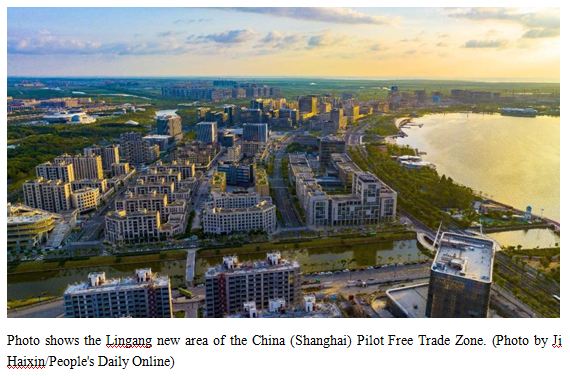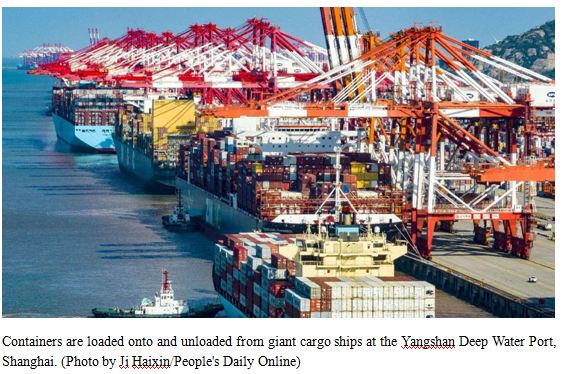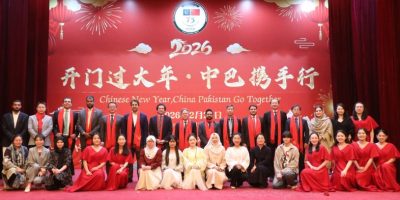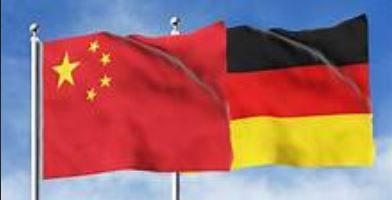Ten years on, Shanghai free trade zone becomes pacesetters of opening-up

By Liu Shi’an, Xie Weiqun, Fang Min, People’s Daily
Building pilot free trade zones (FTAs) is an important strategic measure of China to comprehensively deepen reform and expand opening up in the new era.
This year marks the 10th anniversary of the establishment of China’s first pilot FTZ in Shanghai. Over the past decade, the China (Shanghai) Pilot Free Trade Zone, or Shanghai FTZ, has achieved a series of important outcomes in liberalizing and facilitating trade and investment, promoting financial openness and innovation, and enhancing governance capability of the government.
Aligned with international economic and trade practices, the Shanghai FTZ introduced a negative list for foreign investment upon its establishment. Market access for foreign investment has transitioned from a review-based system to a filing-based one. Today, there number of items on the list has been shortened to 27 from 190 , with no restrictions imposed on the manufacturing sector.
This July, leading circular materials technology company Umicore headquartered in Belgium set up a technology development company in the Waigaoqiao Bonded area of the Shanghai FTZ, with an investment of 15 million euros ($15.92 million).
“Less items on the negative list mean less restrictions. The market access for foreign investment is getting wider and wider, which better facilitates the investment of enterprises,” said Zhang Kefang, an executive of Umicore.
As the negative list shortened, the Shanghai FTZ has implemented a number of first-in-China projects in 60 areas of opening up including automobile manufacturing, financial services, medical services, and value-added telecommunications. It promoted the formulation of the systems of pre-establishment national treatment and negative list for foreign investment, as well as their incorporation in the foreign investment law, and introduced the negative list for foreign investment to cross-border service trade and market access sectors.
The establishment of a “single window” platform for international trade marked a significant innovation of the Shanghai FTZ in promoting trade facilitation.
As the head of the planning department of Shanghai-based E&P international, a company specialized in the development of information technology in aspects of international trade and port logistics, Pan Xiaodong was involved in the development of the “single window” platform ten years ago.
“Similar to ‘one-stop online service’ in the field of international trade, this platform seamlessly integrates customs, quarantine, maritime, and border inspection information, greatly facilitating customs clearance and trade,” Pan said.
So far, the “single window” platform has served over 600,000 trade enterprises, facilitating the data processing of more than a quarter of China’s total trade in goods.
The Shanghai FTZ takes institutional innovation as its core task, with a focus on generating replicable and scalable institutional outcomes. Of the 302 institutional innovation outcomes for FTZs promoted nationwide, nearly half were pioneered or synchronously piloted in Shanghai.
Finance is a crucial area for the experimentation of free trade. Speaking of the opening up of the financial sector, Lu Fang, CEO of J.P. Morgan Securities (China) Co., Ltd. noted that foreign investment in the financial sector used to be subject to equity ownership restrictions. “The Shanghai FTZ has been at the forefront of financial liberalization,” Lu added.
The free trade account introduced by the Shanghai FTZ is a “pioneer” in innovative cross-border RMB business, with integrated financial services for cross-border settlement and financing in both RMB and foreign currencies.
As of now, Shanghai has cumulatively opened 144,000 free trade accounts, handling the equivalent of 142 trillion yuan ($19.5 trillion) in cross-border settlement transactions, with an average annual growth of 61 percent. The total financing that enterprises have obtained through free trade accounts in RMB and foreign currencies totaled 2.8 trillion yuan.
International asset management institutions are increasingly flocking to the Shanghai FTZ. Since 2020, nine of the world’s top ten asset management companies have chosen to establish offices in Shanghai’s Pudong New Area.
“We firmly believe in the potential of the Chinese market and will continue to bring our diverse range of resources to Shanghai, exploring new models for the development of asset management companies in China,” said general manager of Schroder Investment Management (Shanghai) Co., Ltd. Zhang Lan.
By combining the expansion of opening up with institutional reforms, Shanghai has been actively promoting the transformation of government functions, innovative management models, optimized operational mechanisms, and a shift in service approaches.
It continuously works to optimize the market-oriented, law-based, and internationalized business environment. It is reported that Shanghai has delegated over 100 municipal-level administrative approval matters to the government of Pudong New Area.
“Recently, a new Lawson convenience store opened in Pudong, and the procedures went smoothly,” said Jin Ye, deputy director of the business risk control department of Shanghai Lawson, Inc.
“In the past, it would take nearly two months to complete the procedures for opening a store, but now it only takes two to three days,” Jin noted.
After a decade of hard work, the Shanghai FTZ has achieved remarkable success. By the end of 2022, over 84,000 enterprises had been newly registered in FTZ, along with more than 14,000 new foreign-funded projects. The total amount of foreign investment reached $58.6 billion.
In 2022, Pudong New Area’s GDP hit 1.6 trillion yuan, 2.5 times higher than that of 2013. Since its establishment, the Lingang new area of the Shanghai FTZ has experienced an average annual GDP growth of 21.2 percent.

Related News

Beijing, Islamabad reaffirm all-weather strategic partnership
ISLAMABAD, FEB 22 /DNA/ – On the occasion of the Chinese Spring Festival (Year ofRead More

China wants ‘new level’ in Germany ties, Beijing’s FM tells Merz
MUNICH, FEB 15: China’s top diplomat Wang Yi told German Chancellor Friedrich Merz that BeijingRead More


Comments are Closed